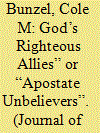| Srl | Item |
| 1 |
ID:
191898


|
|
|
|
|
| Summary/Abstract |
In mid-2000, the publication of the anti-Taliban book Kashf Shubuhāt al-Muqātilīn caused a stir in jihādī circles. Written by Arab jihādīs based in Peshawar, Pakistan, the book made the case that it was not permissible for Muslims to fight alongside the Afghan Taliban on the grounds that the group was not sufficiently Islamic, having committed a host of polytheist acts. While some of the jihādī movement’s leading scholarly authorities quickly refuted the book, its anti-Taliban arguments nonetheless gained popularity over time. Today, the jihādī movement is divided between those who see the Taliban as a legitimate Islamic movement worthy of praise and support (the view espoused by al-Qaida and its supporters) and those who perceive it as an apostate movement standing in the way of true Islamic revival (the view adopted by the Islamic State and its supporters). The controversy over Kashf Shubuhāt al-Muqātilīn in 2000 prefigures the current divide and provides something of the context in which it should be understood.
|
|
|
|
|
|
|
|
|
|
|
|
|
|
|
|
| 2 |
ID:
172438


|
|
|
|
|
| Summary/Abstract |
The Syrian civil war prompted a new wave of religious discourse in Saudi Arabia as the Saudi government and its clerics expressed support for the Sunni protesters in Syria. The issues of jihad and Sunni groups fighting in Syria received significant clerical attention; the Saudi ʿulamāʾ of various political persuasions, including “activists” and “quietists”, commented on the events in Syria. Following the rise of ISIS as the war progressed, the ʿulamāʾ became themselves the subject of scrutiny for allegedly providing the foundations for extremism in Syria. Both the rhetoric of the clerics, as well as Saudi Salafi religious traditions more broadly, came under immense attack domestically and internationally. This article examines how the Saudi clerics dealt with these criticisms. It analyses the rhetoric and actions of the clerics in relation to ISIS’s brand of Salafism, both theologically and politically. It finds that the Saudi ʿulamāʾ of various political persuasions are contesting claims to Salafism, resulting in heated debates and attempts to reconstruct Saudi religious traditions.
|
|
|
|
|
|
|
|
|
|
|
|
|
|
|
|